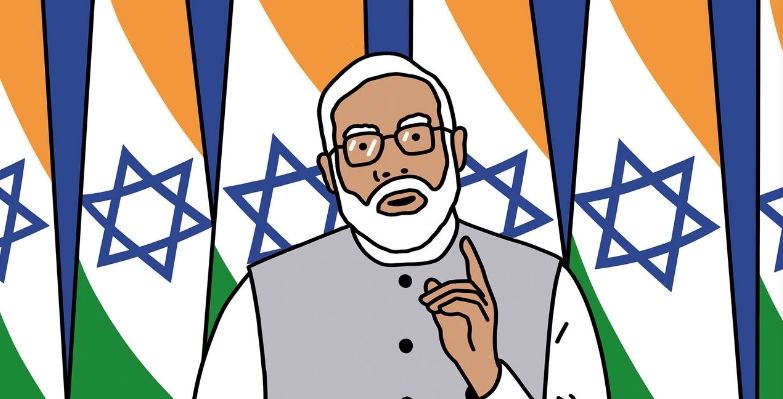 纳伦德拉-莫迪让印度从巴勒斯坦转向以色列 这一战略重点反映了印度的国内政治和在中东的新利益
纳伦德拉-莫迪让印度从巴勒斯坦转向以色列 这一战略重点反映了印度的国内政治和在中东的新利益
Narendra Modi has shifted India from the Palestinians to Israel The pivot reflects Indian domestic politics and new interests in the Middle East
译文简介
过去,像许多全球南方国家一样,印度在表达对以色列支持的同时,也会表达对巴勒斯坦人困境的关切。现在不会如此了。莫迪在哈马斯袭击数小时内就上了X(前身为Twitter),表达了他对“恐怖袭击”的震惊,并宣布“我们与以色列站在一起”。在印度外交部回应记者的问题时,花了五天时间重申印度仍然支持解决冲突的两国方案。10月27日,与其通常的投票记录不同,印度弃权,因为联合国大会通过了呼吁在加沙实施人道主义停火的决议;印度反对决议案的文章里面,没有谴责哈马斯袭击事件。
正文翻译

FOREIGN NEWS usually gets short shrift in India. Yet for the past month the country’s television channels have been dominated by wall-to-wall coverage of events in Israel and Gaza, mostly from Israel’s perspective. News anchors in bulletproof vests stand in the desert delivering breathless reports on the aftermath of Hamas’s atrocities in Israel on October 7th. Talk-show hosts restage the Palestinian terrorist group’s attack from Gaza with toy soldiers and miniature bulldozers. Weeks into the war, coverage remains intense.
外国新闻通常在印度不受关注。然而,过去一个月,该国的电视台却用以色列的视角和立场,来报道以色列和加沙的事件。新闻主播穿着防弹衣站在沙漠中,呼吸急促地报道哈马斯于10月7日和以色列的战争。脱口秀主持人用玩具士兵和推土机模型重新演绎了巴勒斯坦恐怖组织在加沙的袭击。战争进行了数周,报道仍然非常多。
The media’s fascination with Israel’s plight and retribution coincides with a marked shift in the Indian government’s stance on the conflict between Israel and the Palestinians. It has moved from backing the Palestinians to more or less unqualified support for Israel. The pivot is based on a realist reappraisal of Indian interests in the Middle East. It has also met with strong public backing from Narendra Modi’s domestic supporters, which is gratifying for Mr Modi’s government ahead of state elections this month and a general election next year.
在以色列和巴勒斯坦之间的冲突后,媒体更多报道了以色列的处境,印度政府立场的转变速度之快。已经从支持巴勒斯坦转变为对以色列支持了。这种转变基于印度在中东利益的重新评估。这也得到了纳伦德拉·莫迪政府本月州选举和明年大选前的公众地支持,对莫迪的政府来说是有利的。
在以色列和巴勒斯坦之间的冲突后,媒体更多报道了以色列的处境,印度政府立场的转变速度之快。已经从支持巴勒斯坦转变为对以色列支持了。这种转变基于印度在中东利益的重新评估。这也得到了纳伦德拉·莫迪政府本月州选举和明年大选前的公众地支持,对莫迪的政府来说是有利的。
In the past, like many countries in the global south, India tempered any expression of support for Israel with expressions of concern for the Palestinians’ plight. No more. Mr Modi took to X (formerly Twitter) within hours of Hamas’s assault to express his horror at the “terrorist attacks” and declare that “we stand in solidarity with Israel”. It took five days for India’s Ministry of External Affairs to reiterate, in response to questions from reporters, that India continued to support a two-state solution to the conflict. On October 27th, in a departure from its usual voting record, India abstained as the UN General Assembly adopted a resolution calling for a humanitarian ceasefire in Gaza; it obxted that the text did not condemn Hamas’s assault.
过去,像许多全球南方国家一样,印度在表达对以色列支持的同时,也会表达对巴勒斯坦人困境的关切。现在不会如此了。莫迪在哈马斯袭击数小时内就上了X(前身为Twitter),表达了他对“恐怖袭击”的震惊,并宣布“我们与以色列站在一起”。在印度外交部回应记者的问题时,花了五天时间重申印度仍然支持解决冲突的两国方案。10月27日,与其通常的投票记录不同,印度弃权,因为联合国大会通过了呼吁在加沙实施人道主义停火的决议;印度反对决议案的文章里面,没有谴责哈马斯袭击事件。
过去,像许多全球南方国家一样,印度在表达对以色列支持的同时,也会表达对巴勒斯坦人困境的关切。现在不会如此了。莫迪在哈马斯袭击数小时内就上了X(前身为Twitter),表达了他对“恐怖袭击”的震惊,并宣布“我们与以色列站在一起”。在印度外交部回应记者的问题时,花了五天时间重申印度仍然支持解决冲突的两国方案。10月27日,与其通常的投票记录不同,印度弃权,因为联合国大会通过了呼吁在加沙实施人道主义停火的决议;印度反对决议案的文章里面,没有谴责哈马斯袭击事件。
The shift reflects India’s growing defence and commercial ties to Israel. Co-operation between the two countries has been deepening ever since Israel provided India with military help during the Kargil war against Pakistan in 1999. That was long before America took a serious interest in military co-operation with India. Over the past decade India has bought missiles, drones and border-security equipment (and probably surveillance software, though it has not admitted this) from Israel, making it the Israeli defence industry’s biggest foreign customer.
这种转变反映了印度与以色列的国防和商业关系的日益加深。两国之间的合作自1999年,以色列在印巴战争中向印度提供军事帮助开始。那是在美国与印度的军事合作之前。在过去的十年中,印度从以色列购买了导弹、无人机和边境安全设备(也可能是监视软件,尽管印度没有承认),使印度成为以色列国防工业最大的外国客户。
原创翻译:龙腾网 https://www.ltaaa.cn 转载请注明出处
这种转变反映了印度与以色列的国防和商业关系的日益加深。两国之间的合作自1999年,以色列在印巴战争中向印度提供军事帮助开始。那是在美国与印度的军事合作之前。在过去的十年中,印度从以色列购买了导弹、无人机和边境安全设备(也可能是监视软件,尽管印度没有承认),使印度成为以色列国防工业最大的外国客户。
原创翻译:龙腾网 https://www.ltaaa.cn 转载请注明出处
A bromance between Mr Modi and Binyamin Netanyahu, Israel’s prime minister, has deepened the relationship. So has the two countries’ shared preoccupation with fighting terrorism, especially the Islamist variant. Explaining the abstention in the UN vote, Subrahmanyam Jaishankar, India’s foreign minister, said in a speech on October 29th that India took a strong position on terrorism “because we are big victims of terrorism”.
莫迪和以色列总理本雅明·内塔尼亚胡之间的兄弟情谊加深了两国关系。两国对打击恐怖主义,尤其是面临伊斯兰恐怖主义的这一共同点也加深了这种关系。印度外交部长苏布拉曼扬·贾伊沙卡尔在10月29日的讲话中,解释了印度在联合国投票中的弃权原因,称印度在恐怖主义问题上采取了强硬立场,“因为我们是恐怖主义的受害者”。
原创翻译:龙腾网 https://www.ltaaa.cn 转载请注明出处
莫迪和以色列总理本雅明·内塔尼亚胡之间的兄弟情谊加深了两国关系。两国对打击恐怖主义,尤其是面临伊斯兰恐怖主义的这一共同点也加深了这种关系。印度外交部长苏布拉曼扬·贾伊沙卡尔在10月29日的讲话中,解释了印度在联合国投票中的弃权原因,称印度在恐怖主义问题上采取了强硬立场,“因为我们是恐怖主义的受害者”。
原创翻译:龙腾网 https://www.ltaaa.cn 转载请注明出处
India has also been increasing its ties with Gulf Arab countries, especially Saudi Arabia and the United Arab Emirates. And it can ill afford to alienate them; it depends on them for much of its oil and goodwill towards an estimated 9m expatriate Indian workers. Yet the fact that both countries have recently moved closer to Israel has allowed Mr Modi to effect his shift with alacrity. Even in the current crisis, the Saudis and Emiratis appear reluctant to allow the events in Gaza to cause a rupture in their long-term rapprochement with Israel.
印度也在加强与海湾阿拉伯国家的联系,特别是沙特阿拉伯和阿拉伯联合酋长国。而印度无法承受疏远它们的后果;印度依赖它们提供大部分石油,以及900万印度外籍工人的工作岗位。然而,这两个国家最近都与以色列走得更近,这让莫迪得以迅速实现他的外交转变。即使在当前的危机中,沙特和阿联酋似乎也不愿让加沙事件破坏它们与以色列的长期友好关系。
印度也在加强与海湾阿拉伯国家的联系,特别是沙特阿拉伯和阿拉伯联合酋长国。而印度无法承受疏远它们的后果;印度依赖它们提供大部分石油,以及900万印度外籍工人的工作岗位。然而,这两个国家最近都与以色列走得更近,这让莫迪得以迅速实现他的外交转变。即使在当前的危机中,沙特和阿联酋似乎也不愿让加沙事件破坏它们与以色列的长期友好关系。
Domestically, the Modi government’s pivot is essentially all upside. The Congress-led opposition has condemned it; leaders of India’s 200m Muslims have heavily criticised Israel’s military response. Yet the Indian middle-class that mostly backs Mr Modi is especially concerned about Islamist terrorism. Its members look on Hamas’s attack and recall the tragedy Mumbai suffered in 2008, when Pakistani Islamists killed 175 people and wounded more than 300 during a four-day rampage. It included an attack on a Jewish community centre in the city, where the terrorists murdered the rabbi and his pregnant wife.
在国内,莫迪政府的转变基本上只有好处。国大党的反对派谴责了这一举动;印度2亿穆斯林领袖强烈批评了以色列的军事行动。然而,大多数支持莫迪的印度中产阶级特别担心伊斯兰恐怖主义。他们看到哈马斯的袭击,回想起2008年孟买遭受的悲剧,当时巴基斯坦伊斯兰分子在为期四天的疯狂行动中杀死了175人,受伤300多人。其中包括对城市的一个犹太社区中心的袭击,恐怖分子杀害了拉比和他怀孕的妻子。
在国内,莫迪政府的转变基本上只有好处。国大党的反对派谴责了这一举动;印度2亿穆斯林领袖强烈批评了以色列的军事行动。然而,大多数支持莫迪的印度中产阶级特别担心伊斯兰恐怖主义。他们看到哈马斯的袭击,回想起2008年孟买遭受的悲剧,当时巴基斯坦伊斯兰分子在为期四天的疯狂行动中杀死了175人,受伤300多人。其中包括对城市的一个犹太社区中心的袭击,恐怖分子杀害了拉比和他怀孕的妻子。
There is a small risk the government will overplay its hand. As the civilian death toll in Gaza rises, India’s Arab partners might turn against the Israelis and their backers more aggressively. Mr Modi has latterly hedged against that possibility. He has reached out to Palestinian leaders, offering Indian condolences and humanitarian aid. Meanwhile, his Hindu-nationalist henchmen are unrestrained in using the conflict to stoke the Islamophobia that has propelled their party’s rise. Even if Mr Modi’s pivot becomes difficult abroad, it will probably help him win elections.
印度政府可能有一点做过了头。随着加沙的平民死亡人数上升,印度的阿拉伯伙伴可能会更积极地对以色列及其支持者采取行动。莫迪最近已对这种可能性进行了规避。他已与巴勒斯坦领导人取得了联系,提供印度的慰问和人道主义援助。与此同时,他的印度教民族主义党羽,在利用这场冲突煽动伊斯兰恐惧症。即使莫迪的转向阻力大,依然可能会帮助他赢得选举。
印度政府可能有一点做过了头。随着加沙的平民死亡人数上升,印度的阿拉伯伙伴可能会更积极地对以色列及其支持者采取行动。莫迪最近已对这种可能性进行了规避。他已与巴勒斯坦领导人取得了联系,提供印度的慰问和人道主义援助。与此同时,他的印度教民族主义党羽,在利用这场冲突煽动伊斯兰恐惧症。即使莫迪的转向阻力大,依然可能会帮助他赢得选举。
评论翻译
很赞 ( 12 )
收藏